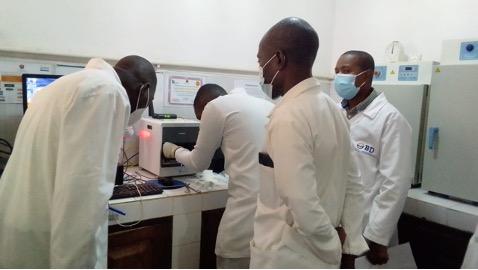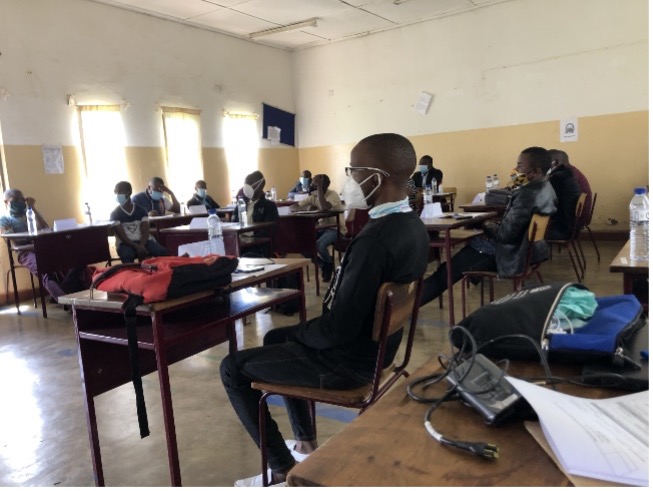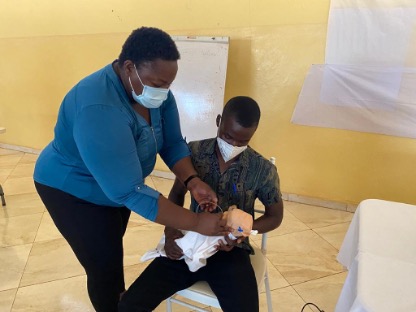April 05, 2022
Tuberculosis (TB) remains the leading cause of death for patients with HIV. An estimated 56% of patients with TB in Mozambique also have HIV, and the country has one of the world’s lowest TB case detection rates at only 37%– a dangerous combination.
To improve these conditions, the University of Maryland, Baltimore (UMB), through Ciheb Mozambique and in partnership with the Ministry of Health (MOH), established the Laboratory Systems Enhancement for AIDS Pandemic Control (LAPSEC) project in 2020. This project supports CDC Mozambique by providing direct technical assistance and support to enhance laboratory capacity and competencies for HIV services. It also focuses on improving individual and facility performance in patient diagnosis, care monitoring, and related services in order to achieve the World Health Organization’s (WHO) 95-95-95 goals.
A key LAPSEC strategy in achieving the WHO’s 95-95-95 goals is the project’s Xpert Ultra rollout. Xpert Ultra, or the Xpert MTB/RIF Ultra assay, is an automated molecular test with an improved ability to detect tuberculosis and rifampicin resistance. Xpert Ultra improves on Xpert MTB/RIF G4 assay, the previous model, by overcoming its limitation of inadequate sensitivity in patients with paucibacillary disease or HIV.
Lab Strengthening
UMB has been guiding the Nampula TB Reference Lab (NTRL) – one of the three TB reference labs in Mozambique – through strategies and interventions to decrease TB culture contamination rates which affects the sensitivity of TB detection. Under UMB’s guidance, the laboratory increased the concentration of Polymyxin B, Amphotericin B, Nalidixic acid, Trimethoprim, and Azlocillin (PANTA) antibiotic mixture from 1x to 1.5x on 21 May 2021 (Q3). PANTA is used in liquid media for the cultivation of mycobacteria in the testing of TB to reduce overgrowth of normal flora present in sputum. A senior technical advisor was hired to support the lab in resolving non-conformances identified during the internal audit; they also improved quality indicators.
UMB also helped strengthen the lab quality management system (QMS) for the NTRL and improve TB diagnostic. In Q4 of 2021, UMB and NTRL visited Nampula three times, providing training, tools, and support. This resulted in improved proficiency of technicians, improved workflow, reduced turnaround time, implementation of first and second-line drug susceptibility testing (DST), and preparation of the lab for the IPAC audit to maintain accreditation.
GeneXpert
UMB trained clinicians and lab technicians in all 11 provinces on Xpert MTB/Rif Ultra (Ultra) for TB detection.. These trainings, conducted both onsite and through workshops, focused on adhering to diagnostic algorithms, interpreting results and managing patients, and increasing GeneXpert testing demand.
In Q3 2021, UMB visited health facilities with operational GeneXpert in Niassa, Maputo City, Inhambane, Gaza, and Sofala to monitor GeneXpert use and to monitor clinicians’ adherence to diagnostic algorithms . Here, clinicians and lab technicians were trained on diagnostic algorithms with a focus on Xpert Ultra, sample processing, and equipment maintenance.

GeneXpert site visit in Sofala Province
UMB had 23 participants attend the Xpert workshop conducted in Niassa, 30 in Maputo City, and 44 in Sofala. The data gathered during facility visits was used during the workshops. Participants included clinicians and lab technicians from all sites; representatives from the Provincial Health Services; and implementing partners supporting clinical, laboratory, and community TB activities.

Clinician and lab technician workshop in Niassa
In Q4 2021, UMB visited five health facilities with operational GeneXpert in Maputo Province to monitor GeneXpert utilization and adherence to diagnostic algorithms by clinicians, sample processing, and equipment maintenance by lab technicians. The lab technicians were trained on the algorithm, including resolution of trace and indeterminate results. UMB brainstormed ways to implement a pilot for stool testing on GeneXpert for TB detection in children, and supported training of 492 participants on sample collection for TB diagnosis in eight provinces. This was done to improve TB detection, especially in children and people living with HIV (PLHIV) who have difficulties providing a spontaneous sputum sample.

Sample collection training
UMB successfully analyzed the impact of Ultra implementation across 2021. Xpert productivity consistently increased, with this being attributed to trainings leading to improved laboratory competencies and other interventions by other implementing partners having an impact in the increased demand for Xpert testing.
Successes
By reducing the turnaround time, analyzing data to measure impact, and providing support to health facilities, UMB is working to increase the efficiency of health facilities in Mozambique. Xpert training and implementation will go a long way in increasing access to testing and treatment for the people of Mozambique, reducing TB infection mortality and increasing the quality of life of Mozambicans.
Contact
Center for International Health, Education, and Biosecurity
Institute of Human Virology
Tyler New
Scientific Writer
tnew@ihv.umaryland.edu

